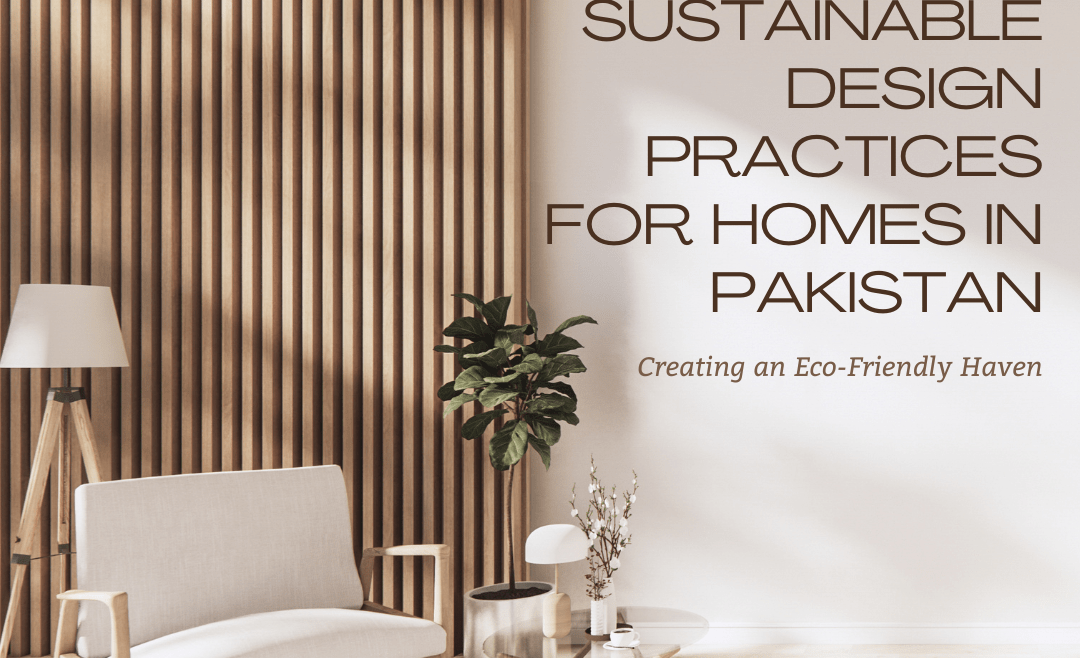Sustainable Design Practices for Homes in Pakistan
https://lyseisdesign.com/wp-content/uploads/2023/06/Sustainable-Design-Practices-for-Homes-in-Pakistandern-design-1024x1024.png 1024 1024 Maham Muhammad (NCA Architect) Maham Muhammad (NCA Architect) https://secure.gravatar.com/avatar/722e510db3bea08fe7f564f4589483e2?s=96&d=mm&r=gCreating an Eco-Friendly Haven
Introduction
As the cost of living rises in Pakistan, many homeowners tend to use cheaper products without considering their long-term impact. However, it’s crucial to understand that using subpar materials or inefficient electrical products can actually cost you more in the long run. In this blog, we will explore practical ways to incorporate sustainable design practices into your home in Pakistan, considering the unique challenges and opportunities of the region. From energy efficiency to smart positioning of appliances, we’ll provide valuable tips, tricks, and personal experiences to help you create an eco-friendly and cost-effective living space.
1. Energy-Efficient Appliances for Lower Bills:
In Pakistan, where electricity costs are increasing, choosing energy-efficient appliances becomes paramount. Opt for appliances with high energy star ratings, as they consume less electricity while providing the same functionality. This not only helps you save money on utility bills but also reduces strain on the power grid and lowers your carbon footprint. For example, in our interior design project for a client in DHA, we recommended energy-efficient air conditioners and LED lighting fixtures to reduce electricity consumption and lower utility bills. Investing in energy-saving appliances not only saves you money but also contributes to a greener environment.
2. Optimize Natural Lighting and Ventilation:
Make the most of Pakistan’s abundant sunlight by incorporating large windows, skylights, and light tubes into your home design. This allows natural light to illuminate your interiors, reducing the need for artificial lighting during the day. Additionally, it enhances the overall aesthetics of the space and creates a more inviting atmosphere. In a home renovation project in Islamabad, we strategically positioned windows to maximize natural light while minimizing direct heat gain. This not only reduces the need for artificial lighting but also helps keep the interiors cooler, reducing reliance on air conditioning during the hot summer months.
3. Harness Solar Power:
Pakistan’s ample sunlight makes it an ideal location for harnessing solar power. By installing solar panels on your roof, you can generate clean and renewable energy to power your home. Solar power systems provide a sustainable alternative to grid electricity, reducing your reliance on the grid and protecting you from rising electricity prices. Consider investing in solar panels, as we did in our project for a client in Bahria Town, to reap the long-term benefits of reduced energy costs and a smaller carbon footprint.
4. Sustainable Building Materials and Techniques:
Incorporate sustainable materials and construction techniques to minimize environmental impact. Opt for locally sourced materials to support the local economy and reduce transportation emissions. Consider using eco-friendly alternatives such as bamboo flooring, reclaimed wood, and low VOC (volatile organic compounds) paints. These materials not only contribute to a greener environment but also enhance the overall aesthetic appeal of your home. Additionally, consider incorporating personal experiences like using white cement on rooftops and side walls, as we did in an Islamabad project, which drastically reduces heat absorption and keeps the interiors cooler, thereby reducing the need for excessive cooling.
5. Efficient Cooling and Electrical Outlets:
Properly position air conditioning units to ensure efficient cooling and avoid placing them in direct sunlight. In our projects in Islamabad and Rawalpindi, we advised clients on the optimum placement of AC units based on the room layout and orientation. This helps ensure that the cool air is distributed effectively throughout the space and minimizes energy wastage. Strategically position electrical outlets to minimize wiring length and energy loss, enhancing overall efficiency. By placing outlets strategically, you can minimize the use of extension cords and reduce energy wastage.
6. Water Conservation and Management:
Water scarcity is a concern in Pakistan, and incorporating water-saving practices into your home is essential. Install low-flow fixtures, such as faucets and showerheads, to reduce water consumption without compromising on functionality. Harvest rainwater
and utilize it for non-potable purposes like gardening and cleaning. Consider using recycled or graywater for irrigation to minimize water wastage. In a home renovation project for a client in Gulberg, we implemented a rainwater harvesting system and installed water-saving fixtures, significantly reducing the household’s water consumption.
7. Waste Management and Recycling:
Promote waste reduction by incorporating recycling systems and composting in your home. Educate your family about the importance of segregating waste and encourage the use of eco-friendly products. Minimize single-use plastic by opting for reusable alternatives and explore creative upcycling ideas to repurpose items instead of disposing of them. In our projects in Islamabad and Bahria Town, we emphasized waste management practices by integrating recycling bins into the kitchen design and incorporating composting solutions in the garden.
By embracing sustainable design practices, Pakistani homeowners can create environmentally friendly homes while minimizing costs in the long run. From energy efficiency to smart cooling strategies and water conservation, small changes can make a significant impact. Incorporate these practical tips, tricks, and personal experiences into your home to create a comfortable, eco-friendly haven. At Lyseis Design, we have successfully implemented sustainable design practices in numerous projects across Islamabad, Bahria Town, DHA, Gulberg, and beyond. Contact us today for expert advice and assistance in transforming your home into a greener space that reflects your values and contributes to a sustainable future.



